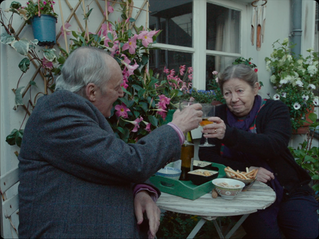Jim Jarmusch, 1984

U.S. OUT OF EVERYWHERE
YANKEE GO HOME
This is the message—graffiti emblazoned on the shutters of a vacant storefront—that greets Hungarian immigrant Eva upon her arrival in New York. While the act of vandalism is, of course, a statement against a larger American imperialism, it takes on a decidedly apolitical, personal meaning over the course of Jim Jarmusch’s Stranger Than Paradise. As the aimless characters move from city to city—and from country to country—in search of something to break up the tedium of life, the specter of the graffiti haunts the narrative. Get out of everywhere, go home.
The push and pull of this, the constant need to keep moving in friction with the yearning for home, is a hallmark of the road movie. New York is meant to be just a stopover in Eva’s trip from Budapest to Cleveland, where she’ll move in with her elderly aunt Lotte. The shape of a journey seems to form itself only to be halted: Lotte is ill and in hospital, Eva will have to spend the next ten days at her card-counting cousin Willie’s apartment. He’s less than thrilled by the imposition, she’s annoyed by the delay to her plans and stifles under the sense of confinement. Out, go.
Eva and Willie sit in his claustrophobic studio in a dilapidated downtown tenement, smoking cigarettes and watching cartoons; sometimes, they’re joined by Willie’s friend and partner-in-petty-crime, Eddie. The apartment is a self-contained universe. Jarmusch traps the characters in a series of long, static shots with flat lighting. The windows are over-exposed during the day and under-exposed at night, we get the sense that they’re in a void. And yet it’s less a purgatory and more a cocoon. Go home. The trio fall into a playful, reluctantly affectionate routine—the very enemy of the road film.
But this is just the beginning of a pattern Jarmusch sets out. We watch as the characters move from one room to another; Willie’s apartment is followed by Lotte’s Cleveland living room and then a cheap beachside motel room. At each stop, Willie seems to be searching for something he lost when Eva left his home. He’s trying to recreate the ease, the effortless comfort of the days spent in his cramped studio, but he can’t admit it—“I just want to get out of here, see something different for a few days” he tells Eddie before they leave New York to follow Eva. Get out.
“You know, it’s funny,” Eddie proclaims midway through the film. “You come to someplace new and everything looks the same.”
“No kidding, Eddie,” Willie responds. Our own eyes as an audience, however, expose the lie here. We’ve already seen New York City’s claustrophobic, sun-blotting buildings and dirty streets give way to the flat, openness of a snowy Cleveland; soon, after this exchange, they’ll migrate down to Florida with its palm trees and ruddy beaches. There is an irrefutable visual difference between all of these places; we see what the characters either cannot or don’t want to. The irony is that upon entering Cleveland, Willie and Eddie drive past the onion-domed churches of the city’s various immigrant communities, leading Eddie to ask whether Cleveland looks like Budapest; Eddie registers Cleveland’s newness upon arriving, he remarks on it, but the tedium of sitting in room after room—the thing that was so magical the first time around—flattens his perception of place.
Jarmusch ends the film with a screwball series of mishaps and missed connections. In Florida, Eva reaches her breaking point and goes to the airport. She considers a series of flights to Europe: Madrid, Paris, and, of course, Budapest. Go home. We cut to black as she considers her options. Suddenly, Willie and Eddie are at the airport trying to discern where she’s gone. Willie boards a plane hoping to find Eva and convince her to stay. Throughout the film, Willie has resisted his Hungarian upbringing and insisted on his Americaness, and still, he unwittingly gets trapped on a flight back to Budapest—YANKEE GO HOME.
Yet we know Eva’s not on that plane with him. With the choice to leave or to stay in front of her, Eva is the character who finally chose “stay” as she returns to the motel room and waits. Jarmusch spends much of the film subverting the conventions of the road movie with scene after slow scene in confined spaces, with abrupt stops and starts rather than a fluid, meditative journey; but throughout Stranger Than Paradise, Jarmusch upholds the genre’s fixation on what happens when we try to outrun ourselves. Whether a place is new or old, the same or different from what came before, it doesn’t matter. Eva comes back to that trashy dive on the Florida coastline because she understands what they’ve all been running from. The old adage becomes a truism: wherever you go, there you are.






Comentarios